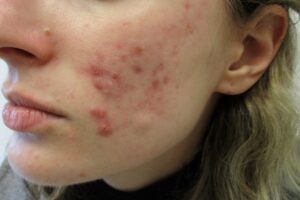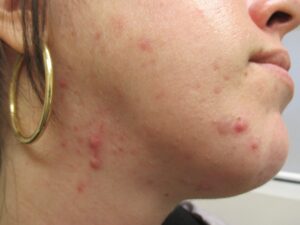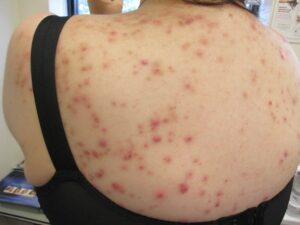
Article by Dr. Benjamin Barankin MD, FRCPC, FAAD
Cystic acne is a less common, but more severe form of inflammatory acne. Dr. Benjamin Barankin, a Toronto dermatologist and spokesperson for the Acne and Rosacea Society of Canada, helps us understand what cystic acne is, the causes and treatments for this difficult skin condition.

Cystic acne is a serious type of inflammatory acne. Cysts are red, swollen, firm bumps filled with pus and fluid. These large, painful and inflamed lesions often extend deep into the skin.
Cystic acne is considered a severe form of acne as it is both painful and worrisome and can also lead to scarring and other permanent changes in the skin.
The cystic type of acne commonly affects teenage boys and young men, with cysts frequently appearing on the face, back and upper arms. Women can also get cystic acne, and for them it more commonly occurs on the lower half of the face and neck.

Cysts start like other pimples. Pores can get clogged with oil and dead skin. If bacteria also get into the pore, they can cause inflammation or infection, making the skin appear red and swollen.
Hormonal changes are often the main culprit, and there is also a genetic influence such that cystic acne tends to run in families.
Cystic acne left untreated can cause scars, which may appear as pits, shallow depressions or raised bumps. There can also be leftover red or dark-colored marks where cysts used to be. These long-term consequences can be emotionally distressing and are often difficult to treat.

Because cystic acne is painful, worrisome and can lead to scarring, consult a family physician or dermatologist early to start treatment as soon as possible. Over-the-counter topical medications and face washes and even topical prescription therapy are typically inadequate. Consultation with a doctor is essential to ensure optimal treatment.
Treating cystic acne can require a combination of medications. A dermatologist can inject steroids into the cyst for a quick fix to reduce the inflammation, but this is not a long-term solution.
The treatment regimen may include a topical retinoid and/or topical benzoyl peroxide and/or topical antibiotic, often along with an oral antibiotic.
Women have the option of taking oral hormonal medications, such as the birth control pill or spironolactone, to try to combat cystic acne.
Another commonly recommended medication is oral isotretinoin which is very effective and requires careful monitoring by your physician.
Other treatments such as photodynamic therapy or other laser-based treatments, chemical peels, microdermabrasion, and facials may be used as supportive treatment options in some cases.
(More details about the above treatment options can be found here – How to Treat Severe Acne)
Most treatment regimens must be followed for at least 2-3 months before true improvements in the skin are seen, although results vary from person to person.
With oral antibiotics, look for significant improvement at around 3 months and for isotretinoin at around 4-7 months.
Acne may worsen or flare during the first month, but improvement in the skin can typically be seen after approximately 6 weeks.
For most people, isotretinoin will successfully and permanently clear the skin of acne, although repeated courses are sometimes required.
When hormonal therapy is used, results can take about 3 months and therapy is often continued for 6-12 months or even longer.
The best thing you can do for your skin is to maintain a daily skin care routine with which you are comfortable and consistent. Gentle washing and moisturizing and not over-scrubbing are key. The skin is not “dirty” so it does not need to be over-washed which can aggravate the already inflamed skin.
Many “natural” remedies such as applying toothpaste or apple cider vinegar to pimples are not of any real benefit. Be sure to follow your doctor or dermatologist’s guidance on how and when to take any prescribed medications.
Also, refrain from picking or “popping” or squeezing a cyst as it can cause the infection or inflammation to deepen and spread, worsening the breakout and increasing the risk of scarring.
Always helpful are lowering your stress levels, getting adequate sleep, eating healthy (e.g. eating a low glycemic diet; eliminating dairy and exercising).
Not to be forgotten are the mental health consequences of severe acne. Up to 50% of adolescents report psychological difficulties due to acne, such as depression and anxiety. It is important to check in with your family, friends and doctor for support.
Although cystic acne is severe, treatment is available and effective. If you find painful, red, swollen bumps on your skin, or any evidence of scarring, be sure to promptly schedule an appointment with your family doctor or dermatologist to find the most effective treatment for you.
About the Author
Dr. Benjamin Barankin is a Toronto dermatologist and spokesperson for the Acne and Rosacea Society of Canada. He is also Medical Director and founder of the Toronto Dermatology centre. Madelaine Bell, a 2nd year medical student at the University of Toronto, assisted Dr. Barankin with this article.
Test your acne knowledge. You may be surprised at some of the answers…